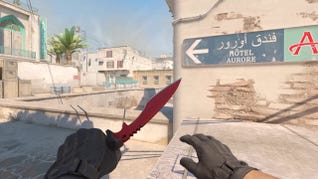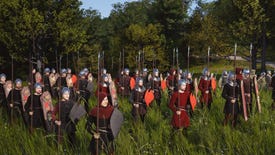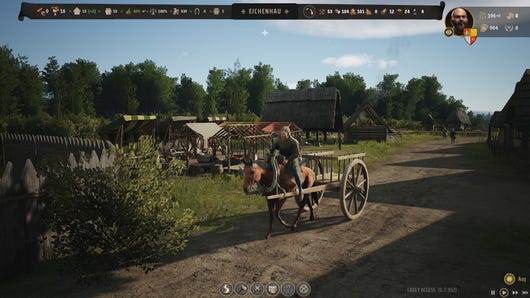-

If you want a single-player Lethal Company, don't miss the developer's previous It Steals
Pac-Man meets Slender Man
-

I followed this ox around in Manor Lords for a day to see what wisdom it could teach me
Quite a lot, it turns out
-

Review: Phantom Fury review: a retro shooter obsessed with inconsequential do-hickeys
No arm in trying
-

Stay awhile and play this free Diablo-inspired indie as the mayor of Tristram
The home of the official unofficial best thing in games
-

Counter-Strike 2 finally gets left-handed view models, seven months after launch
Valve reinstates a CS:GO staple
-

Even if we never get Stellar Blade on PC, action-RPG Aikode looks comparably swish
Another student of the school of Nier: Automata
-
I tried to recreate Stray in Lethal Company, with disastrous results
You know what they say about curiosity and the cat
-
Review: Another Crab's Treasure review: a playful Soulslike for everyone, especially if you like crabs
This will more than tide you over
-
The Maw - 22nd-27th April 2024
This week's least outwardly offputting game releases, plus our weekly newsblog
Live
Psst! Explore our new "For you" section and get personalised recommendations about what to read.
-

Upgrade your Steam Deck storage with Corsair's MP600 Mini 1TB SSD for just £70
Pair one of the best M.2 2230 SSDs with your Steam Deck for a healthy storage boost.
-

£25 for a pair of speakers sounds great to us
These Creative Pebble V3 speakers are a great choice for rich, clear audio on a budget.
-

Get the fastest PCIe 4.0 SSD for $139 at Amazon
Save over $50 on the Crucial T500.
-

You can get a WD Black SN850X 2TB SSD for as little as £112 but they're selling fast
Save up to £28 on this speedy SSD using the eBay app and a special discount code.
-

It’s gone down as you’d expect
-

The survival-horror game arrived in March after multiple delays
-

Its puzzle-platforming is even built on some of Celeste’s open-source code
-

Developer, meanwhile, is planning to rebalance the archers
-

Even if we never get Stellar Blade on PC, action-RPG Aikode looks comparably swish
Another student of the school of Nier: Automata
-
Stay awhile and play this free Diablo-inspired indie as the mayor of Tristram
The home of the official unofficial best thing in games
-
Counter-Strike 2 finally gets left-handed view models, seven months after launch
Valve reinstates a CS:GO staple
-
You can now feed people to the big beast in The Wandering Village
A snack on the back
-
New Escape From Tarkov PvE mode exclusive to pricey Unheard edition despite promises of free DLC
Community manager insists mode doesn't qualify as DLC
-

Supporters only: Unpacking the cursed digital object that is Steam’s clown reaction emoji
But doctor, I am mostly positive!
I don’t want to strike sweaty terror into anyone’s gentle hearts here, but I’m beginning to suspect lately that the friendly clown emojis I keep seeing as reactions to Steam user reviews aren’t actually a colorful kudos to the writer for being a chucklesome and whimsical individual. I’m starting to fear, actually, that this one icon of a behatted japester may have been widely adopted …
-

Supporters only: Lethal Company is as much about protecting the mundane, as it is a horror game
They should put my new coffee grinder in there
-
Supporters only: Watching Civil War made me want more games with black and white stances on morality
I can't think of any good modern examples!
-
Supporters only: Piecing It Together gave me a timely little island of calm
Good thing I got my pieces
Get your first month for £1 (normally £3.99) when you buy a Standard Rock Paper Shotgun subscription. Enjoy ad-free browsing, our monthly letter from the editor, and discounts on RPS merch. Your support helps us create more great writing about PC games.
See more information-

Review: Phantom Fury review: a retro shooter obsessed with inconsequential do-hickeys
No arm in trying
-

Review: Another Crab's Treasure review: a playful Soulslike for everyone, especially if you like crabs
This will more than tide you over
-

Review: Sand Land review: a boring Mad Max lite that should have been very exciting
More like Bland Land, am I right?
-

The best farming games like Stardew Valley on PC
The cream of the crop
-

A very puzzling collection
-

The 15 best open world games on PC
Keep your options open
-

Review: Botany Manor review: peaceful and beautiful best-in-show plant puzzles
Come away, O human child! To the waters and the wild
-

The best microSD cards for the Steam Deck
Expand your Steam Deck’s storage with these tried-and-tested cards
-

Should You Bother With... Hall effect keyboards?
Heroes of might and magnets
-

Arise now, ye Cerim: No Rest for the Wicked’s performance updates are underway
Already running better on low-end GPUs
-

No Rest for the Wicked’s PC performance suggests the wicked might be better off waiting
Got them early access growing pains
-

Stay awhile and play this free Diablo-inspired indie as the mayor of Tristram
The home of the official unofficial best thing in games
-

Gorgeous interactive fiction Pine: A Story Of Loss is a small sad game about a big sad man
Chopping wood, cutting onions
-

SUDDEN DEATH is a free slice of interactive fiction about love, drugs, and Australian football
some of it is also about chips
-

It’s gone down as you’d expect
-

The survival-horror game arrived in March after multiple delays
-

Its puzzle-platforming is even built on some of Celeste’s open-source code
-

Developer, meanwhile, is planning to rebalance the archers
-

Review: Phantom Fury review: a retro shooter obsessed with inconsequential do-hickeys
No arm in trying
-
Deals: Upgrade your Steam Deck storage with Corsair's MP600 Mini 1TB SSD for just £70
Pair one of the best M.2 2230 SSDs with your Steam Deck for a healthy storage boost.
-
I followed this ox around in Manor Lords for a day to see what wisdom it could teach me
Quite a lot, it turns out
-
Even if we never get Stellar Blade on PC, action-RPG Aikode looks comparably swish
Another student of the school of Nier: Automata
-
Supporters only: Unpacking the cursed digital object that is Steam’s clown reaction emoji
But doctor, I am mostly positive!
-

How to make weapons and armor in Manor Lords
Here's how to construct a good supply of weapons and armor in Manor Lords
-

How to get started with Manor Lords
-

How to increase Approval in Manor Lords
Here's how to keep your Approval level high in Manor Lords
-

How to build the Manor in Manor Lords
Here's how to construct the titular Manor in Manor Lords
-

King Legacy codes list [April 2024]
Codes you can redeem in King Legacy for free Beli, Gems, and more!
-

Anime Fighters Simulator codes
Nab yourself a variety of boosts and other rewards with these codes
-
Redeem these Blade Ball codes for free Coins and free Spins
-
Honkai Star Rail codes (April 2024)
Gain Stellar Jade and more rewards with these Honkai: Star Rail codes before they expire!
-
Manor Lords: How to build Market Stalls
How to set up a full Marketplace of Stalls in Manor Lords
-
Manor Lords: Best Development Upgrades
Prioritise these Development Upgrades for the best possible start in Manor Lords












